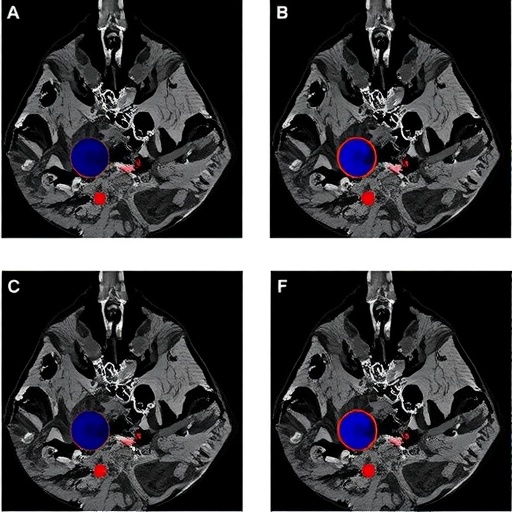In a significant advancement for cancer research, a new study has shed light on the prognostic value of MCM2 in type B thymomas, a subset of thymic epithelial tumors (TETs). Unlike many malignancies where reliable biomarkers remain elusive, this research uncovers a promising candidate that could revolutionize prognosis and targeted treatment strategies for these rare mediastinal cancers.
Thymic epithelial tumors, located in the mediastinal region, are the most frequent neoplasms affecting the thymus gland, yet they suffer from a lack of dependable prognostic markers. This gap has hindered clinicians’ ability to precisely predict disease progression and tailor therapeutic approaches. Addressing this clinical challenge, a multidisciplinary research team utilized state-of-the-art molecular and computational biology tools to identify key genetic indicators that correlate with patient outcomes.
The investigative process commenced with mRNA microarray analyses of paired tumor and peritumoral tissue samples from thirty patients diagnosed with type B thymomas. This high-throughput screening enabled the identification of differentially expressed genes (DEGs) by comparing tumor tissue gene expression against adjacent non-tumor tissue. Strikingly, 734 DEGs emerged, highlighting the complex molecular landscape of thymic tumors and providing a rich dataset for downstream analysis.
To pinpoint genes with significant clinical relevance, the researchers applied protein-protein interaction (PPI) network analysis, a sophisticated bioinformatics method that uncovers highly connected ‘hub’ genes within the molecular circuitry of cancer cells. This approach is crucial for identifying drivers of tumor biology rather than mere background noise. Among several hub candidates, MCM2, a gene encoding minichromosome maintenance complex component 2, was selected for more in-depth examination due to its pivotal role in DNA replication and cell cycle regulation.
MCM2 is known for its function in the initiation of DNA replication, ensuring genomic fidelity during cell division. Its involvement in oncogenesis has been documented in various cancers, but its exact influence within TETs required elucidation. By integrating survival data and enrichment analysis, the study demonstrated that elevated MCM2 expression correlates with significantly extended progression-free survival (PFS) times. Specifically, patients exhibiting higher MCM2 levels had a hazard ratio (HR) of 0.17, indicating a markedly reduced likelihood of disease progression.
Furthermore, multivariate analysis revealed that MCM2 operates as an independent prognostic factor, maintaining its predictive power even when adjusting for other clinical variables. This independent risk stratification capacity underscores MCM2’s utility as a biomarker that could inform individualized patient monitoring and treatment decisions, potentially improving clinical outcomes for those affected by type B thymomas.
Intriguingly, the researchers observed a gradient in MCM2 expression among thymoma subtypes classified as type B1 through B3. They documented a decreasing trend in MCM2 levels across this spectrum, suggesting a molecular underpinning tied to tumor differentiation and aggressiveness. This gradation offers insights into thymoma biology, where diminished MCM2 expression might reflect progressing malignancy or resistance mechanisms.
The implications of these findings are manifold. Primarily, MCM2’s association with enhanced prognosis introduces a paradigm shift that challenges earlier assumptions about its role solely as a proliferation marker. Instead, MCM2 appears to serve a protective function or mark a less aggressive tumor phenotype in the context of type B thymomas.
Moreover, the study promotes the integration of molecular diagnostics into routine pathology workflows. Incorporating MCM2 immunohistochemical staining or mRNA expression profiling could assist pathologists and oncologists in better classifying thymomas and anticipating disease trajectories. Such advancements pave the way for personalized medicine approaches tailored to the genetic makeup of individual tumors.
Despite these promising developments, the authors emphasize the necessity for further research, including larger patient cohorts and experimental validations to unravel the mechanistic pathways linking MCM2 to thymoma pathophysiology. Animal models and functional assays are required to dissect how MCM2 modulates cell cycle control, apoptosis, or immune interactions within thymic neoplasms.
Furthermore, evaluating whether MCM2 expression predicts responsiveness to existing therapies, such as chemotherapy, radiotherapy, or immune checkpoint inhibitors, could guide therapeutic innovations. If MCM2 positivity correlates with favorable responses, it might become a companion diagnostic marker for selecting optimal treatment regimens.
This comprehensive study, published in BMC Cancer, fills a critical gap by delivering robust evidence for a novel, accessible biomarker that promises to improve prognosis determination for patients with thymic epithelial tumors. The clarity it brings to the heterogeneity of type B thymomas could ultimately translate into enhanced survival and quality of life for affected individuals.
As thymic cancers remain relatively rare and understudied, the impact of this research extends beyond its immediate clinical setting. It exemplifies how integrative approaches combining genomics, bioinformatics, and clinical data can yield transformative insights applicable across oncology disciplines.
Researchers and clinicians alike are hopeful that these findings will spur follow-up studies and drive the incorporation of MCM2 into future staging systems and therapeutic protocols. The revelation of MCM2 as a favorable prognostic marker highlights ongoing efforts to combat cancer through precise molecular characterization rather than traditional, broad classifications.
This study’s revelation offers a beacon of hope in thymoma research—a field long hampered by diagnostic ambiguities and therapeutic uncertainties. With MCM2 as a guiding biomarker, the path toward more effective, personalized treatment of thymic epithelial tumors grows increasingly attainable.
In summary, the discovery that MCM2 expression is inversely related to thymoma aggressiveness and directly linked with improved progression-free survival represents a milestone in understanding these enigmatic tumors. Its application promises to refine prognostic accuracy and inform clinical decision-making, ultimately contributing to better patient outcomes and advancing the frontiers of cancer biomarker research.
Subject of Research: Thymic epithelial tumors, specifically type B thymomas, and the prognostic role of MCM2 expression.
Article Title: Expression and prognostic value of MCM2 in type B thymomas.
Article References:
Du, X., Cui, J., Yu, X. et al. Expression and prognostic value of MCM2 in type B thymomas. BMC Cancer 25, 1506 (2025). https://doi.org/10.1186/s12885-025-14807-4
Image Credits: Scienmag.com
DOI: https://doi.org/10.1186/s12885-025-14807-4
Tags: advancements in cancer biomarkersbiomarkers in cancer researchclinical relevance of MCM2differentially expressed genes in tumorsgenetic indicators of tumor progressionMCM2 expression in thymic tumorsmediastinal cancer treatment strategiesmRNA microarray analysis in oncologyprotein-protein interaction network analysistargeted therapy for thymomasthymic epithelial tumors studytype B thymomas prognosis





